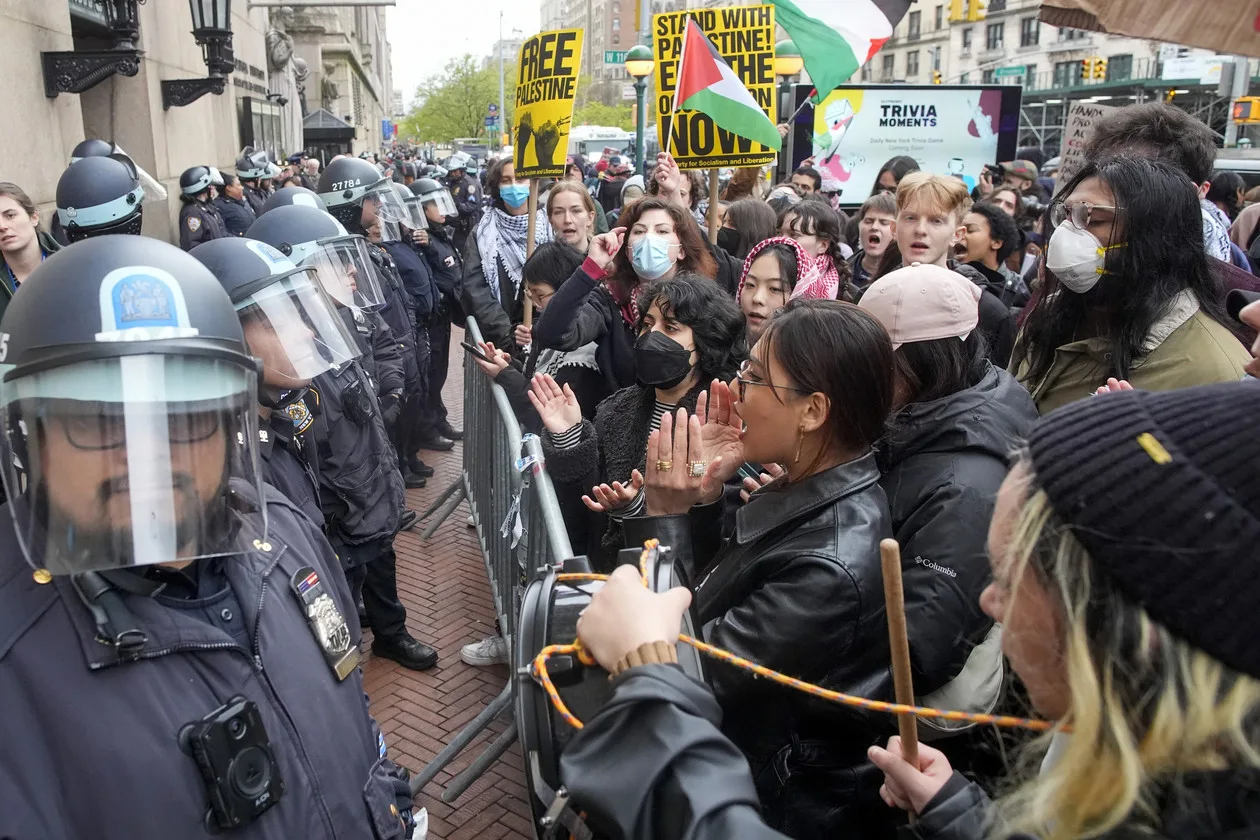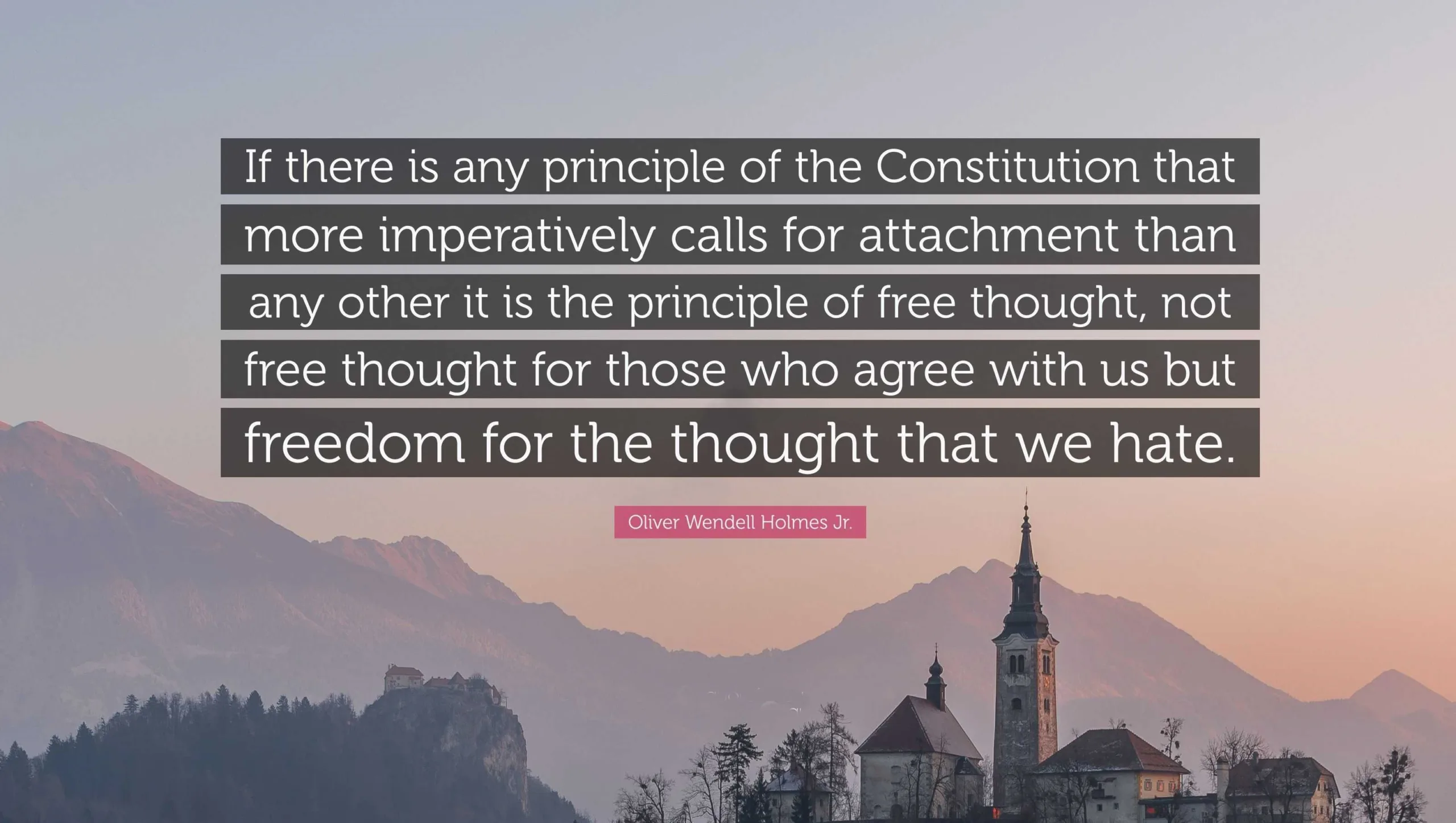
Freedom for the Thought That We Hate

Justice Oliver Wendell Holmes, Jr., wrote the thought above in his dissent in a Supreme Court case in 1929. United States v. Schwimmer, 279 U.S. 644 (1929) was about a Hungarian woman who wanted to become a U.S. citizen but she refused to take the oath of allegiance because, as a self-declared pacifist, she would not take up arms to defend the United States. She lost the case, but Holmes made his point.
I keep thinking of Holmes’ words as I watch and read about the fierce protests underway at Columbia University, the cancellation of the valedictorian’s speech at USC, and the growing unrest on many other campuses since the start of the Israeli-Hamas war and the horrific destruction of Gaza resulting in an appalling death toll. The protests at Columbia have evoked incredibly hateful and dangerous rhetoric — the threats against Jewish students at Columbia are outrageous and demand forceful action. At the same time, the repression of legitimate non-violent protest by pro-Palestinian students is shocking. The cancellation of speeches because they might provoke protests seems completely contrary to the purpose of a university.
A university, is, or should be, a place of free and open expression, broad perspectives and often-loud debates. Our job is to encourage our students and faculty to seek the truth, and the process is often messy, chaotic and loaded with controversy and challenge to conventional wisdom. We have to hear the ideas before we know whether we agree or disagree with them; and disagreement is not license to ban speech at all, but rather, to add another point of view to the conversation. To repress speech is to stifle ideas, to limit knowledge, to snuff out the very life of intellectual expansion and discovery.
We have to allow the expression of the “thought that we hate” in order to be true to the purpose of the university. Allowing expression does NOT mean that we agree with the statement, but rather, that we uphold the value of freedom of thought and speech. That’s what we do as universities — or what we are supposed to do.
Are some thoughts so hateful that we have to prevent their expression? Yes. Even Justice Holmes famously said, in another case, that “shouting ‘fire!’ in a crowded theater” was not protected speech, Schenck v. United States, 249 U.S. 47 (1919). To threaten physical violence against any person is not protected speech. To advocate for the genocide of Jews or Palestinians or any people is not protected speech. On a university campus, to disrupt operations to the point where students and faculty cannot attend class or go about their lives in safety and peace is potentially not protected expression. But in all cases, the facts matter very much.
I have not been to Columbia, I do not know what it’s like to be on that campus right now, and I cannot possibly know what President Minouche Shafik and her administrative team knew about the pro-Palestinian students camped out on the lawn in the Gaza Solidarity Encampment that made the administration decide to call the New York City Police on Friday; hundreds of arrests ensued. I have to believe they had information about dangers and threats not revealed publicly.
What I do know, however, from long experience as a college president, is that administrative actions that prevent speech quite often backfire, inflaming many onlookers who might otherwise have remained neutral. The issue moves quickly from the question of whether someone is pro-Palestine or pro-Israel to the issue of the fundamental right of speech and expression. Few actions bring campuses together more quickly than administrative repression of free speech.
I also know this: members of Congress, starting with North Carolina Congresswoman Virginia Foxx who chairs the House Committee on Education, seem focused on humiliating American higher education, and Foxx and her allies have singled-out four of the most elite private universities in the nation for extreme bullying and manipulation. Sure, the four institutions — Harvard, MIT, Penn and now Columbia — have the wealth and intellectual resources to carry on even though they have been badly wounded by their puzzling performances before the committee. But the rest of us — thousands of other colleges and universities that are not so famous or wealthy or elite — must now bear the burden of the fallout from this stunning abuse of Congressional authority. Foxx and her allies shamefully used antisemitism as a strawperson to berate and bully the elite institutions. The presidents who testified seemed out-smarted (out-Foxxed?) by the interrogations and their answers were disappointing at best — too weak and compromising in the case of the first three (Harvard, MIT, Penn), and then, more recently, completely co-opted by the authoritarian impulse in the case of Columbia’s president who failed to stand up for her faculty and moved against her students soon after the hearing.
In a further shameful abuse of Congressional power to bully a private university, House Speaker Mike Johnson, Rep. Foxx and others went to Columbia’s campus on Wednesday and demanded the resignation of President Shafik. As Professors William LeoGrande and Scott Bass point out in an excellent essay in Insidehighered.com, rightwing politicians are using anti-semitism as a “convenient excuse” to pursue their war on higher education, something that’s been going on for far longer than the Israeli-Gaza conflict.
They write, “The House hearings on antisemitism were designed from the outset to be a political show trial with higher education in the dock. In a private Zoom call, committee member Representative Jim Banks, Republican of Indiana, revealed the Republicans’ real agenda—to defund elite institutions of higher education that MAGA Republicans consider “woke” by cutting off their federal student loan funding and taxing their endowments.”
And they continue in pointing out the real purpose of the attack on higher education: “The assault on higher education is a key front in the Republican right’s campaign to undermine the institutional pillars of democracy. Attacks on the press, the judiciary, the civil service (aka the “deep state”) and elections have gotten more attention, but colleges and universities are no less essential to sustaining a democratic polity.”
What does this moment mean for all of us at Trinity? A few key points:
First, freedom of speech, thought and belief is central to our teaching, our community and our ability to uphold the values of social justice that animate our lives at Trinity. We must listen, respect, and welcome all points of view as much as possible.
Second, we cannot and will not tolerate hate, threats, bullying or intimidation. Saying this does not undermine our commitment to free speech, but does stress our commitment to sustaining a community rooted in respect for each and every person here — respect for human dignity is the first tenet of social justice. Anti-semitism is evil and intolerable. So is hatred expressed toward Palestinians, or Muslims, or immigrants or other persons based on who they are or what they believe.
Third, we are at our best as a learning community if we are able to be in dialogue together about the issues, even those that are difficult, even those that seem divisive. We are near the end of the Spring 2024 semester but as we look ahead to the Fall 2024 semester, I hope that we will find more ways to come together to discuss the profound issues at stake in Gaza, in the Israel-Hamas war, in the American political response, in the Ukraine war and in our own struggles in this country to achieve genuine racial justice.
Fourth, for the faculty: your academic freedom at Trinity is paramount. I urge you to use this freedom to address the critical issues of our times with the deep research, creative pedagogies and passionate commitment you always bring to teaching your students well.
Finally, for Trinity: we were founded 125 years ago by courageous women who were not afraid of the difficult conversations, who had their own moments of disruptive conversations and occasional chaos as they gave Trinity life and purpose. We honor them each day as we move this great mission forward to be witnesses for peace and justice in a world that knows too little of those values. Let’s always remember our purpose to be a community of hope and change for those who need us. We cannot be that community in silence; we must speak up and out, and we must listen to each other as we try to discern the ways in which we can change the world.